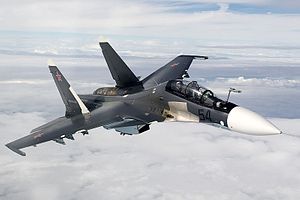The Islamic Republic of Iran is holding consultations with Russia over the purchase of an unknown number of Sukhoi Su-30SM multi-role fighter jets, according to the Iranian minister of defense, General Hossein Dehghan.
“We don’t need other long-range air defense systems (in addition to the S-300 and Bavar-373); we no longer plan to purchase them. Therefore, the Iranian Defense Ministry’s agenda includes consultations with Russia on the purchase of Sukhoi aircraft. We need to strengthen our Air Force,” Dehghan said on Iranian TV on August 21.
Russia is currently in the process of delivering S-300PMU-2 Favorite long-range surface-to-air missile (SAM) batteries to Iran (See: “Russia Delivers First Missiles for Iran’s New Air Defense System”). Iran is planning to induct the domestically developed Bavar-373 long-range mobile air defense system by the end of the year.
As I reported in February, Tehran is expected to sign a contract with Russia for the co-production of an undisclosed number of Russian-made Sukhoi Su-30 multirole fighter aircraft by the end of the year. Iran and Russia purportedly first discussed a possible combat aircraft deal in the summer of 2015 during the MAKS airshow, held near Moscow.
The Su-30SM is a 4++ generation multipurpose fighter aircraft. As I explained elsewhere (See: “Russia to Receive Over 30 New Su-30 Fighter Aircraft”):
The Su-30SM is based on the Su-30 MKI export version, an aircraft jointly developed by Russia with Hindustan Aeronautics Limited for the Indian Air Force. However, the two-seat SM is a localized variant of the MKI and unlike the latter does not contain Israeli and French avionics. It retains, however, the same airframe made of titanium and high-strength aluminum alloys and also features the MKI’s AL-37FP thrust-vectoring engines among other things.
Russia has also offered to license-produce the third-generation T-90 main battle tank in Iran.“Under the so-called Joint Comprehensive Plan of Action (JCPOA), an international agreement on the nuclear program of Iran signed in July 2015, the UN arms embargo will be lifted 5 years after the JCPOA adoption day. However, conventional weapons sales can be decided on a case-by-case basis meanwhile,” I explained earlier in the year.
However, already in April a senior U.S. official testified that the United States would block any sale of Russian combat aircraft to Iran. “We would block the approval of fighter aircraft,” Thomas Shannon, the U.S. undersecretary of state for political affairs said. “We’ve got a commitment … from the Russians in terms of working to prohibit the transfer of technologies to Iran’s ballistic missile program,” Shannon added.
































